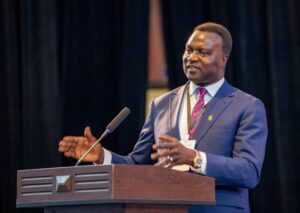Police Refute Allegations of Shooting at Kumasi’s Electoral Commission Office During “Enough is Enough” Protest

The Ghana Police Service has officially denied any involvement in a shooting incident at the Electoral Commission’s (EC) office in Kumasi during the recent “Enough is Enough” demonstration. This protest, organized by the opposition NDC, called for an independent audit of the voters’ register ahead of the 2024 elections. Tensions escalated when demonstrators tried to storm the EC office, leading to confrontations with the police. Despite reports of gunfire, the police confirmed that no shooting occurred and no injuries were reported.
The protestors gathered to voice concerns about the accuracy of the voters’ register, arguing that the current process lacks transparency and could compromise the credibility of the 2024 elections. As demonstrators approached the EC office in Kumasi, some attempted to forcefully enter, but they were restrained by police officers on the scene. This led to rumors and media reports suggesting that shots had been fired in an attempt to disperse the crowd.
However, in an official statement, the police clarified that while tensions were high, there was no use of firearms. Law enforcement deployed crowd control tactics but denied any shooting or violence during the confrontation. The police also urged the public to disregard such reports and assured Ghanaians that the situation was under control.
The “Enough is Enough” demonstration has become one of several public protests in recent months, reflecting growing public concerns about the upcoming elections. The NDC continues to press for electoral reforms, arguing that without an independent audit of the voters’ register, the election could be compromised.
Despite the police’s denial, the incident highlights the political tension as Ghana moves closer to the 2024 elections. The opposition remains steadfast in its demands for transparency, while the Electoral Commission maintains that it is operating within the framework of Ghana’s electoral laws.



